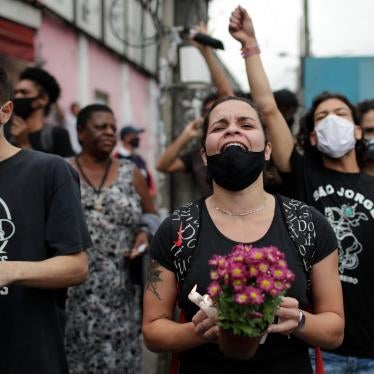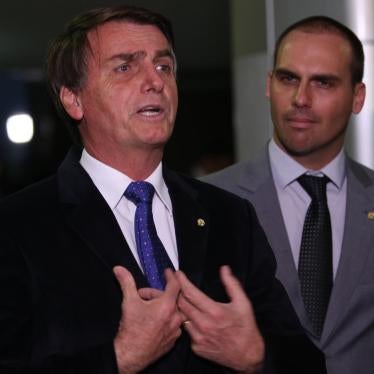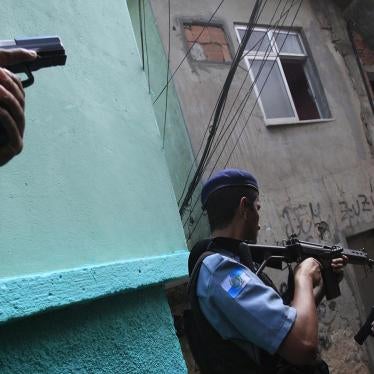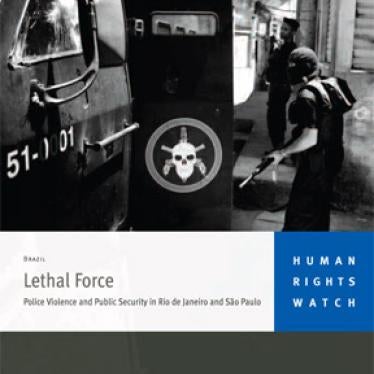The following document is a response by Human Rights Watch to a question posed by Supreme Court justice Edson Fachin during a hearing to discuss strategies to reduce police killings in Rio de Janeiro on April 19, 2021.
QUESTION POSED TO HUMAN RIGHTS WATCH BY SUPREME COURT JUSTICE EDSON FACHIN
You mentioned forensic analysis carried out by the State of Rio de Janeiro is flawed. What were the recommendations issued by international forensic experts to the State? What are the flaws identified in HRW reports?
HUMAN RIGHTS WATCH RESPONSE
Dear Supreme Court Justice Edson Fachin,
Thank you for the question and, most importantly, for an extremely productive and revealing hearing on the crucial human rights issue of police killings in Rio de Janeiro.
Human Rights Watch has conducted research on police conduct and public security in Brazil for decades, with a particular focus in Rio de Janeiro.
In recent years, we have documented in detail more than 80 killings by law enforcement agents in Rio de Janeiro.[1] In those cases, we have examined the circumstances of the deaths and the investigative steps taken. We have also interviewed witnesses, relatives, police officers, forensic experts, prosecutors, attorneys, and public defenders.
In one of those cases, the killing of nine people in the same house during a February 2019 operation in the Fallet neighborhood, we commissioned reports by international forensic experts, as we mentioned at the hearing.[2] Those experts produced two independent reports that pointed to possible destruction of crime scene evidence by police and other serious failures in collecting, preserving, and analyzing critical evidence in the case.
Based on our research and on international human rights standards, we would like to highlight some common problems with the investigations of police killings cases in Rio de Janeiro, starting with the example of the Fallet case, and three key recommendations in response to your question.
The Fallet Case: An Example of Flawed Forensic Analysis and Investigations
Inadequate or missing forensic analysis is a common problem in investigations into police killings in Rio. This problem is illustrated by the investigation into the February 2019 killing by police of at least 13 people in the Fallet and neighboring communities, despite the intense public attention the case received, as at the time, it was the most lethal police operation in Rio in more than a decade.[3] Human Rights Watch sent the autopsy reports of 9 of the 13 victims, who were killed in the same house, to the Independent Forensic Expert Group (IFEG) of the International Rehabilitation Council for Torture Victims (IRCT) and to the Foundation of Forensic Anthropology of Guatemala (Fundación de Antropología Forense de Guatemala, FAFG), who conducted pro bono analyses.[4]
The experts concluded that the multiple gunshot wounds and signs of severe trauma in all victims were types of injuries that “may rapidly lead to death” and in one case they were so severe that “death was highly likely to be instantaneous.”[5] Yet, military police officers said the victims were alive when they took them to the hospital in an effort to save them. They were all dead upon arrival.[6]
The international forensic experts identified grave omissions and errors in the autopsy reports. The three IFEG experts concluded that the autopsies did not meet minimum professional and scientific standards due to their “absolute lack of quality.”[7]
For instance, the autopsy reports say that police did not request gunpowder residue analysis, which was crucial to check whether the victims had indeed opened fire against the officers, as the military police claimed. The autopsy reports also show that the pathologist did not examine the victims’ clothing, a key source of forensic information to understand the circumstances of the death.
The autopsy reports do not include proper descriptions of external and internal injuries, the international forensic experts said. Furthermore, the little information the pathologist included was sometimes partial or even contradictory.
The international forensic experts also pointed out the very poor quality of the photographs of injuries, the lack of photographs of the bullets that were found in the bodies, and the failure to recover all projectiles or to X-ray the bodies to facilitate the recovery.
The Rio de Janeiro pathologist conducted one autopsy in just 10 minutes, and the other eight in 30 to 40 minutes each, his reports say. That is insufficient time for adequate autopsies, especially complex ones that involve multiple traumatic lesions as in this case, both international expert groups concluded separately.
They concluded that the investigation did not follow procedures that are the international standard in cases in which death occurs during law enforcement operations, detailed in the United Nations Manual on the Effective Prevention and Investigation of Extra-legal, Arbitrary and Summary Executions, known as the Minnesota Protocol.
Problems with Police Investigations and Forensic Analysis
Cover-ups of Illegal Use of Lethal Force
Human Rights Watch has documented a variety of practices by Rio police to hamper the investigation of illegal use of lethal force.[8] Those responsible for cover-ups are rarely brought to justice.
False “rescues”
Some police officers in Rio de Janeiro routinely remove the bodies of people killed by police from crime scenes and deliver them to hospitals in what they claim are “rescue” attempts. While these false “rescues” give the appearance of legitimate effort by officers to help victims, in reality they destroy crime scene evidence and hinder forensic analysis.
Removing clothes
In some cases, police fail to safeguard the clothing of people they kill, thereby depriving investigators of a key form of evidence. Items of clothing are important as evidence because, for instance, they may contain traces of soot that could reveal that a shot was fired at close range.
Planting Evidence
Officers sometimes fabricate evidence of shootouts by placing a gun in the victim’s hand and firing it. They also sometimes remove evidence of an unlawful killing or plant fake evidence of criminal behavior, such as drugs.
Intimidating Witnesses
In some of the cases reviewed, Human Rights Watch found that police officers who appear to have carried out extrajudicial executions allegedly threatened witnesses, and in one case faced criminal charges for killing a witness’s son. Such threats create a pervasive fear of testifying against the police, which makes it hard to hold police officers accountable for abuses.
Serious Investigative Flaws
Human Rights Watch has documented scores of cases in which civil police investigators failed to meet the most basic requirements of a homicide inquiry when handling cases involving killings by police.[9] Among those very serious flaws is the low quality or absence of forensic analysis.
Failure to Examine the Crime Scene
Our research shows civil police investigators or forensic teams sometimes do not visit the site of police shootings. Brazilian law requires a forensic expert to analyze the crime scene and collect blood, hair, fibers, and other evidence. In 2016, we documented more than 50 cases of police killings in recent years in which crime-scene analysis was not done.[10] All those cases were handled by regional precincts, not by the civil police homicide departments. A civil police forensic expert told us that the problem of lack of crime scene analysis by regional precincts in cases of police killings remains to this day.[11]
Failure to Properly Question Police and Witnesses
Civil police investigators sometimes fail to take statements from all police officers involved in police killings. Even in cases where they do talk to officers, statements made by police officers are often almost identical and follow a narrative that is repeated again and again, often using the same phrases, in interviews that could only be described as cursory. A military police officer who admitted having participated in extrajudicial killings told Human Rights Watch that in his unit, officers would simply take turns talking to investigators, regardless of who had actually killed the victim.
Another common flaw in investigations is the lack of interviews with any witnesses other than the police officers who participated in the alleged shootout.
Recommendations
We fully agree with your Excellency’s opinion, as expressed in your initial remarks at the hearing, on the need for a plan to reduce police killings in Rio de Janeiro state. We believe that for that plan to be successful, it will require ensuring thorough, prompt, and independent investigations and prosecution of those responsible for illegal use of force and cover-ups in police killings cases.
Develop and Enforce a Protocol for Police Killings Cases that Incorporates International Standards
We applaud your decision requiring that the Minnesota Protocol, the international standard for the prevention and investigation of killings by law enforcement, be applied to police killings in Rio de Janeiro. We recommend that the Rio de Janeiro Prosecutor’s Office examine whether civil and military police, and state forensic personnel, have adequate procedures in place to comply with the Minnesota Protocol, with other international standards, and with Brazilian law.
We recommend that law enforcement forces have a specific, comprehensive protocol for police killings cases that ensures, among other steps, that:
- Crime scenes are preserved by police officers who are not themselves involved in the shooting
- The bodies of dead people are not taken to hospitals but left at the scene for forensic analysis
- Thorough, independent crime scene analysis is carried out in all cases, by forensic experts that are not part of the civil police.
- Gun residue samples are collected from the bodies of victims at the crime scene and analyzed as standard practice in all cases.
- The weapons of all police officers who participated in an operation that resulted in death are immediately handed over to investigators for ballistic analysis.
- All evidence, including clothing of victims, is preserved and the chain of custody of such evidence is scrupulously recorded and respected.
- Police conduct a variety of interviews with non-police witnesses and police officers who participated in the operation and their commanders, not just those officers directly involved in the alleged shootout.
- Autopsies follow the detailed guidelines included in the Minnesota Protocol.
Having such a protocol is, of course, no assurance that it will be followed. As the institution entrusted with “external oversight” of the police under Brazil’s Constitution, the Prosecutor’s Office needs to ensure enforcement of the protocol. When not followed, the Prosecutor’s Office should refer cases to the internal affairs division for disciplinary action, open administrative investigations of police officers, or prosecute police officers for procedural fraud, malfeasance or other crimes, if the evidence warrants it.
Ensure Independent Investigations of Police Killings by the Prosecutor’s Office
We also applaud your Excellency’s finding that investigations of abuses by police carried out by civil police do not meet the “requirement of impartiality, required by international human rights treaties.” We agree with your decision requiring that the Prosecutor’s Office conduct its own investigation in cases of suspected police misconduct. That, however, has happened in just a handful of cases.[12]
The Prosecutor’s Office opened its own investigation into the killing of 28 people, including a police officer, in a police raid in Jacarezinho neighborhood on May 6, 2021, and it told the press that, since your Excellency’s June 5, 2020 decision, it has opened another 44 investigations into police operations that resulted in killings, although it did not specify how many killings were involved.[13] From June 2020 through March 2021 –the last month for which data are available–, Rio police killed 954 people.[14]
Opening their own investigations into a very large volume of cases of suspected police misconduct would require re-organizing the work of the Prosecutor’s Office and may need to be a gradual process, but it has to start immediately. We recommend that the Prosecutor’s Office begin by opening investigations into all cases of killings by civil police, since those are cases in which civil police investigates its own members, and into killings by military police where there are initial allegations or evidence of misconduct.
In addition, it is crucial that the Prosecutor’s Office hire its own forensic experts –instead of the current practice of temporarily employing forensic experts who are members of the civil police. Those experts should help prosecutors assess the quality of forensic work done in specific cases, participate in crime reconstruction —a procedure at the site of an incident in which police officers and witnesses provide statements about what happened, and investigators compare these statements to the forensic reports and physical characteristics of the site—, and conduct their own independent forensic analysis, among other tasks.
Finally, we believe that Rio de Janeiro’s Prosecutor’s Office needs a well-resourced unit of prosecutors dedicated to developing and enforcing police protocols to prevent abuses, and investigating and prosecuting police abuses when they occur. Rio had such a unit, the Group of Specialized Action in Public Security (GAESP), from December 2015 to March 2021, when the new Attorney General eliminated it. [15] We recommend that GAESP be reinstated or a new unit with a similar mandate be created.
Ensure Autonomy of Rio de Janeiro Forensic Experts
Forensic experts should be able to conduct thorough, independent forensic analysis in police killings cases without perceived or actual pressure. Law 12030 from September 2009 granted forensic experts “technical, scientific and functional autonomy.”[16] Nineteen of Brazil’s 27 states have forensic expert offices that are autonomous from the police, although they are still under the state secretary of security.[17] But in the rest, including in Rio de Janeiro, they remain part of the civil police. That has meant, for example, that Rio forensic experts have had to conduct analysis in cases of killings by civil police officers of higher rank than themselves, which severely limits their ability to work independently. In addition, Rio de Janeiro forensic experts do not decide on their budget priorities, which are defined by the civil police chief.
In order to ensure the independence of their work and increase their effectiveness, forensic experts in Rio should be independent from the civil police.
I hope this response answers your Excellency’s question. I, and Human Rights Watch´s Brazil team as a whole, remain available to provide any additional information you may require.
Sincerely,
[1] See some examples of our research: Human Rights Watch, “Lethal Force: Police violence and public security in Rio de Janeiro and São Paulo”, December 4, 2009, https://www.hrw.org/sites/default/files/reports/brazil1209webwcover.pdf (accessed April 5, 2021); Human Rights Watch, “‘Good Cops Are Afraid’: The Toll of Unchecked Police Violence in Rio de Janeiro”, July 7, 2016, https://www.hrw.org/report/2016/07/07/good-cops-are-afraid/toll-unchecked-police-violence-rio-de-janeiro (accessed April 5, 2021); “Brazil: Possible Evidence Tampering in Police Killings”, February 3, 2020, https://www.hrw.org/news/2020/02/03/brazil-possible-evidence-tampering-police-killings (accessed April 5, 2021)
[2] Brazil: Possible Evidence Tampering in Police Killings”, February 3, 2020, https://www.hrw.org/news/2020/02/03/brazil-possible-evidence-tampering-police-killings (accessed April 5, 2021)
[3] Ibid.
[4] International Rehabilitation Council for Torture Victims (IRCT), https://irct.org/; and the Foundation of Forensic Anthropology of Guatemala (Fundación de Antropología Forense de Guatemala, FAFG), https://fafg.org/.
[5] Brazil: Possible Evidence Tampering in Police Killings”, February 3, 2020, https://www.hrw.org/news/2020/02/03/brazil-possible-evidence-tampering-police-killings (accessed April 5, 2021)
[6] The mother of one of the victims told the Public Defender’s Office that she saw a police pickup truck leave the house where the shooting took place with what she believed to be dead bodies in the back and police officers sitting on them. Her testimony seems to be corroborated by a video shot by a bystander and two pictures that show two police pick-up trucks with officers sitting in the back with the feet on top of what appear to be wrapped-up bodies. Rafael Soares, "Vídeo mostra viatura do Choque em frente à casa onde 13 foram mortos no Fallet," Extra, February 12, 2019, https://extra.globo.com/casos-de-policia/video-mostra-viatura-do-choque-em-frente-casa-onde-13-foram-mortos-no-fallet-23445942.html (accessed May 13, 2021); "Suspeitos mortos pela polícia no Rio podem não ter reagido, diz defensoria," Yahoo notícias, February 13, 2019, https://br.noticias.yahoo.com/suspeitos-mortos-pela-policia-no-rio-podem-nao-ter-reagido-diz-defensoria-134309349.html?guccounter=1 (accessed May 13, 2021); "Morte de 13 pessoas no Rio de Janeiro foi execução, afirma comunidade," Ponte Jornalismo, February 9, 2019, https://ponte.org/policia-mata-13-pessoas-em-comunidade-do-rio-de-janeiro/ (accessed May 13, 2021).
[7] Brazil: Possible Evidence Tampering in Police Killings”, February 3, 2020, https://www.hrw.org/news/2020/02/03/brazil-possible-evidence-tampering-police-killings (accessed April 5, 2021)
[8] Human Rights Watch explained those practices in detail in comprehensive reports in 2009 and 2016, and have documented them in additional cases since then. “Lethal Force: Police violence and public security in Rio de Janeiro and São Paulo”, December 4, 2009, https://www.hrw.org/sites/default/files/reports/brazil1209webwcover.pdf (accessed April 5, 2021); Human Rights Watch, “‘Good Cops Are Afraid’: The Toll of Unchecked Police Violence in Rio de Janeiro”, July 7, 2016, https://www.hrw.org/report/2016/07/07/good-cops-are-afraid/toll-unchecked-police-violence-rio-de-janeiro (accessed April 5, 2021); César Muñoz, "A Vote for Luan," El País, November 11, 2018, https://www.hrw.org/news/2017/11/11/vote-luan (accessed May 14, 2021); Human Rights Watch, Brazil: Possible Evidence Tampering in Police Killings”, February 3, 2020, https://www.hrw.org/news/2020/02/03/brazil-possible-evidence-tampering-police-killings (accessed April 5, 2021); César Muñoz, “Brazil Suffers its Own Scourge of Police Brutality,” Americas Quarterly, June 3, 2020, https://www.hrw.org/news/2020/06/03/brazil-suffers-its-own-scourge-police-brutality (accessed May 17, 2021); César Muñoz, “Raid in Rio de Janeiro Leaves 28 Dead,” May 7, 2021, https://www.hrw.org/news/2021/05/07/raid-rio-de-janeiro-leaves-28-dead (accessed May 17, 2021).
[9] Ibid.
[10] Human Rights Watch, “‘Good Cops Are Afraid’: The Toll of Unchecked Police Violence in Rio de Janeiro”, July 7, 2016, https://www.hrw.org/report/2016/07/07/good-cops-are-afraid/toll-unchecked-police-violence-rio-de-janeiro (accessed April 5, 2021)
[11] Human Rights Watch phone interview with a civil police forensic expert, May 4, 2021. Name withheld upon request.
[12] Human Rights Watch, "Letter to Rio de Janeiro’s attorney general, Luciano Mattos," April 16, 2021, https://www.hrw.org/news/2021/04/16/letter-rio-de-janeiros-attorney-general-luciano-mattos (accessed May 13, 2021)
[13] Gabriel Vasconcelos, “MP-RJ cria força-tarefa para apurar mortes em operação do Jacarezinho,” May 11, 2021, https://valor.globo.com/brasil/noticia/2021/05/11/mp-rj-cria-forca-tarefa-para-apurar-mortes-em-operacao-do-jacarezinho.ghtml (accessed May 14, 2021).
[14] ISP Dados, https://www.ispvisualizacao.rj.gov.br:4434 (accessed May 14, 2021).
[15] Human Rights Watch, ”Letter to Rio de Janeiro’s attorney general, Luciano Mattos,” April 16, 2021, https://www.hrw.org/news/2021/04/16/letter-rio-de-janeiros-attorney-general-luciano-mattos (accessed May 13, 2021)
[16] Art. 2, Law n° 12,030 from September 2009, http://www.planalto.gov.br/ccivil_03/_ato2007-2010/2009/lei/l12030.htm (accessed May 13, 2021)
[17] Flávia Medeiros, “Políticas de Perícia Criminal na Garantia dos Direitos Humanos,” Instituto Vladimir Herzog, June 2020, https://vladimirherzog.org/por-uma-pericia-criminal-no-brasil-que-atue-em-defesa-da-vida-e-da-justica/ (May 17, 2021).








